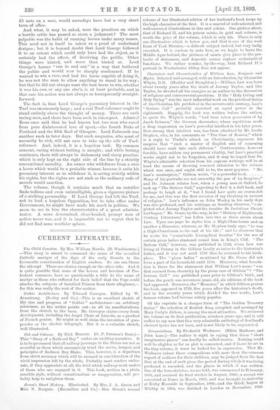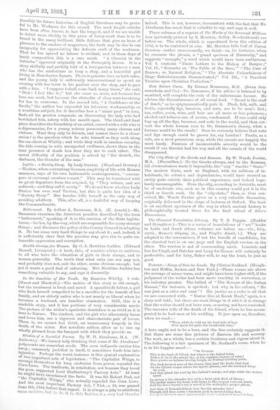Renunciations. By Frederick Wedmore. (Elkin Mathews and John Lane.)—The author
is right in saying that those "short imaginative pieces" can hardly be called stories. Nothing could well be slighter so far as plot is concerned, and if there be art in the tiny volume, it must be looked for in expression. That Mr. Wedmore values these compositions with more than the common regard of authors for their children, may be judged from the fact that at the end of each piece the period during whioli it was being produced is recorded, and the places in which it was written. One of the love-sketches, we are told, was commenced in February, 1888, and received its final strokes in August, 1890; a second was conceived at Tours in March, 1889, and was brought to maturity at Kirby Moorside in September, 1892; and the third, begun at Whitby in 1884, was finished in London in November, 1892. Possibly the future historian of English literature may be grate- ful to Mr. Wedmore for this record. The most fragile articles have been often known to last the longest, and if we are unable to detect more vitality in this piece of fancy-work than is to be found in the many brilliant little fictions that give an hour of pleasure to the readers of magazines, the fault may be clue to our incapacity for appreciating the delicate craft of the workmen. That he has spared no labour is evident, and in these days of hasty composition this is a rare merit. "A Chemist in the Suburbs" appeared originally in the Fortnightly Review. It is a story skilfully and prettily told of a love-passion between a man who has the misfortune to keep a shop, and a beautiful girl living in Manchester Square. There is genuine love on both sides, and the young lady is sufficiently unconventional to spend an evening with her lover in his parlour over the shop, and to part with a kiss. "I suppose I shall come back many times," she said, "Dick I I feel like it ;" but she came no more, not because her love was weak, but because the obstacles of class were too strong for her to overcome. In the second tale, "A Confidence at the Savile," the author has expended his laborious workmanship on a worthless subject, for it describes how a "minor poet" in love, finds all his passion evaporate on discovering the lady who had bewitched him, asleep with her mouth open. The third and final piece describes the friendship of an artist, cursed with a wife who is a dipsomaniac, for a young actress possessing many charms and virtues. Must they only be friends, and cannot there be a closer union ? is the question which he asks himself as they walk along the sea-shore at Whitby ; and while they walk in careless security, the tide coming in with unexpected swiftness, shows them in the near presence of death how dear they are to each other. The moral difficulty of the position is solved by "the drench, the darkness, the thunder of the seas."







































 Previous page
Previous page